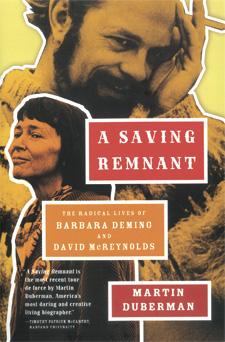As far as formats go, it’s a bit strange. A Saving Remnant is a dual biography, telling the stories of radical US activists Barbara Deming and David McReynolds.
They knew each other but were hardly close friends. So the book traces their mostly separate lives throughout the 1950s and ’60s in alternating passages. The bulk of these chapters are dedicated to Deming’s work toward ending racial segregation and McReynolds’ work in the peace movement.
Both are gay and had active sex lives at the time, especially Deming, whose appetites usually outstripped those of her partners. McReynolds had a few longer-term relationships over that period (plus occasional frolics in New York City subway bathrooms) but struggled to overcome his guilt about being gay.
Then, a funny thing happened. Stonewall. The birth control pill. Harvey Milk. Gay and lesbian liberation took hold among activists, especially young post-war boomers coming of age in the late ’60s. Deming and McReynolds — 53 and 41 years old in 1970, respectively — struggled to come to terms with what was happening around them.
It’s fascinating. They’re both gay. Both spent countless hours in activist organizations. Both landed in jail for their work. Both wrote essay after essay about leftwing politics. And yet, the idea of a political movement based on their sex lives surprised them.
Deming went on to become a fierce feminist and, for a time, a lesbian separatist. Her essays from this period became feminist classics. McReynolds, on the other hand, grew more slowly. He continued to shy away from gay activism, preferring socialism and pacifist organizing.
Their two lives diverge over sexuality. Deming and McReynolds agreed on much, but it was their differing views on pornography that ultimately divided them. Duberman makes good use of letters between the two and quotes their disagreement liberally.
Add in a little gossip (including unflattering portraits of both Andrea Dworkin and Marie-Claire Blais) and the occasional triumph, and it’s a compelling read.


 Why you can trust Xtra
Why you can trust Xtra


